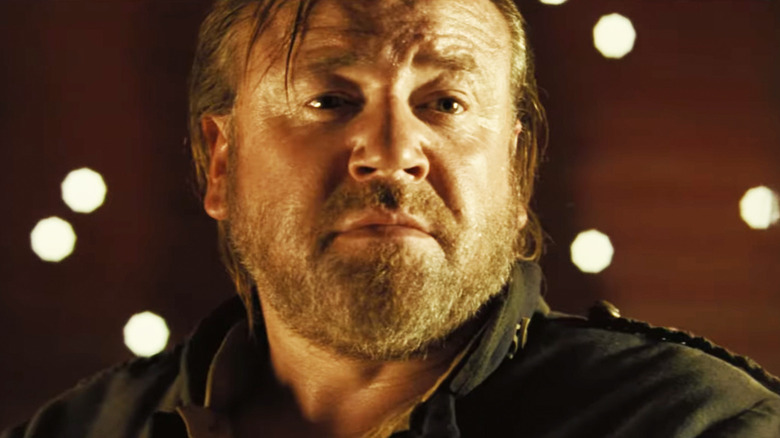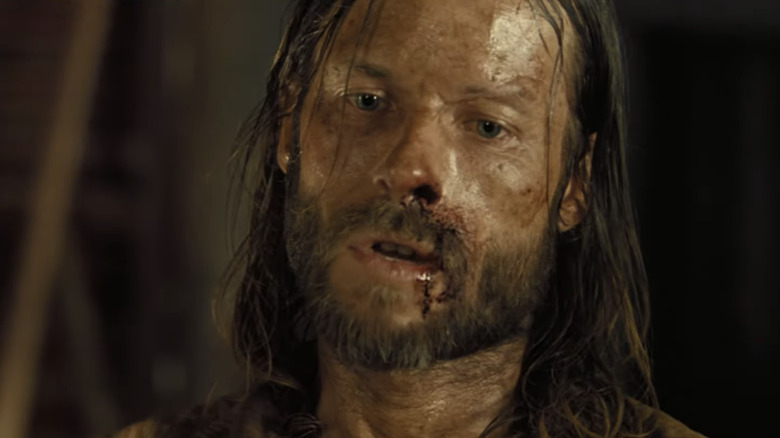An Underrated 2005 Western Streaming On Prime Video Haunted Roger Ebert
The Western may have died in the 1970s, but we've continued to see a slow trickle of great Westerns in the last few decades. Case in point: "The Proposition," an Australian oater that not only impressed most critics, but ended up haunting the late great Roger Ebert, who evidently thought the film played like "a Western moved from Colorado to Hell."
Like Russell Crowe and Nicholas Hoult's criminally underseen Western "True History of the Kelly Gang," "The Proposition" is set in Australia rather than the traditional Old West, and stars Guy Pearce as 1880s bushranger Charlie Burns. After losing a fight with the police, the criminal is presented with the titular choice by Ray Winstone's lawman Captain Morris Stanley. What exactly is the choice? Well, it ain't a very good one. To save his younger brother, Mikey (Richard Wilson), from being put to death, Charlie must find and kill his older brother Arthur (Danny Huston), who is a wanted man. Making matters worse, Charlie has to leave Mikey behind to hunt down his older sibling in one of the Outback's harshest, most unforgiving regions.
The movie was directed by John Hillcoat and penned by none other than Nick Cave, who previously co-wrote the script for 1988's "Ghosts... of the Civil Dead." Much like the elegiac, mournful "Assassination of Jesse James by the Coward Robert Ford," to which Cave contributed a soundtrack, "The Proposition" is very much in the revisionist Western vein, portraying life in the Australian Outback of the 1880s as a savage and unforgiving land populated not by heroes and villains but by complex, selfish, and downright evil individuals — and it's great. At least, Roger Ebert thought so.
Roger Ebert gave The Proposition a perfect score
Roger Ebert handed out some dodgy perfect scores in his time, such as when he gave four stars to a mediocre Samuel L. Jackson thriller or gave a perfect score to a controversial Zack Snyder superhero movie. With his positive take on "The Proposition," however, he might have been onto something.
For Ebert, "The Proposition" was the visual realization of the "vision of that dread and despair" that characterized Cormac McCarthy's celebrated historical novel "Blood Meridian." The critic was taken with Nick Cave and John Hillcoat's brutal version of the Outback, noting how the characters were seemingly Western archetypes, but that none of them truly fit the mold. For one, the outlaws themselves were, in Ebert's estimation, "not merely outlaws, desperados, villains, but dedicated to evil for its own sake," while Ray Winstone's lawman was "not precisely a sheriff since this land is not precisely a place where the law exists."
For Ebert, then, this visceral depiction of a godforsaken land was truly immersive, to the extent he viewed it as a "movie you cannot turn away from" due to its "pitiless and uncompromising" nature that essentially served as an example of everything we as a society should shun — a "record of those things we pray to be delivered from."
Also of note to the critic was the fact that the actors imbued their characters with "human details all the scarier because they scarcely seem human themselves." These characters, who seemed to have certain elements of humanity but either acted inhumanely throughout or deliberately stranded themselves in the hellscape of the Outback seemed to fascinate and trouble Ebert, who ultimately bestowed a full four stars on "The Proposition."

